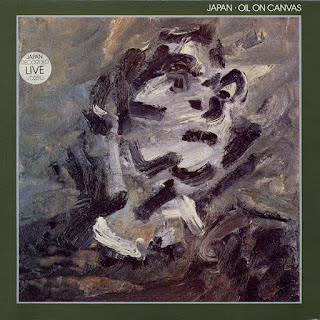Eighties Topalbums: Japan - Oil On Canvas
tracklist:
Oil On Canvas
Sons Of Pioneers
Gentlemen Take Polaroids
Swing
Cantonese Boy
Visions Of China
Ghosts
Voices Raised In Welcome, Hands Held In Prayer
Nightporter
Still Life In Mobile Homes
Methods Of Dance
Quiet Life
The Art Of Parties
Canton
Temple Of Dawn
The year is 1983. At a time when the new wave and the synthsound are the order of the day, Japan is there, a group averse to the entire music scene, which occupies a separate place. Not when one looks at the genesis of the group, which in the early days mainly propagates punk or derived musical styles. And although those musical indulgences do not weigh the group in the country with the same name, the rest of the world still looks at the band with a strange look. Because whatever the group in Europe is trying to do, they seem, partly because of their androgynous image, not to get a firm ground under their feet and after the third album Quiet Life, which notes the first steps towards the later so characteristic style, Ariola Hanse let the group fall. It is precisely this setback that is paid back twice by the new Virgin label. Japan becomes the first new romantics band, while both they and the world are unaware of the typing at that moment. As said, the changes are on the album Quiet Life for the first time. The rugged punk chords are mixed with oriental atmosphere carpets and the characteristic bass line from Mick Karn makes its appearance. More important, however, is the musical and textual yoke that frontman David Sylvian from that moment descend on the other band members. Eventually only the title number will make it to Oil On Canvas. Atmosphere plays a major role within the compositions, in which Chinese and Japanese musical influences seem to be of vital importance. The instrumental Voices Raised In Welcome, Hands Held In Prayer is a wonderful example of this. Within the compositions mainly Karn's bass parts and Barbieri's keyboards form the guideline, while drummer Steve Jansen displays a whole arsenal of unconventional percussion. The serene, sometimes monotonous, vocals of Sylvian seem to complete the whole thing. With Gentlemen Take Polaroids and Tin Drum Sylvian knows how to optimize the sound. When the group, reduced to a quartet, guitarist Rob Dean had to leave, because of the release of their lastest album in 1982, undertakes their worldwide Sons Of Pioneers tour, nobody can imagine that the result will be their swansong. Karn, Barbieri, Jansen and guest guitarist Masami Tsuchiya agree with their role. The resulting Oil On Canvas can best be described as the Best Of compilation of the last three studio albums of Japan, with Tin Drum (represented by seven of the eight songs) being the guiding principle. Gentlemen Take Polaroids delivers five songs and next to Quiet Life the group adds three new instrumental tracks to the whole. The music does mythical, sometimes elusive. The melody lines are masterful and despite the simplicity you can taste the oriental atmosphere everywhere. Listen to the magisterial Canton. Oil On Canvas forms a bridge that connects the East with the West. The level of the album is high although honest to say that the result must mainly be found in the fact that the group has re-recorded large parts of the album in the studio afterwards, with Nightporter being re-recorded in its entirety. At the height of their fame, but in the meantime separated, Oil On Canvas appears to have become the most successful album of Japan.



Comments